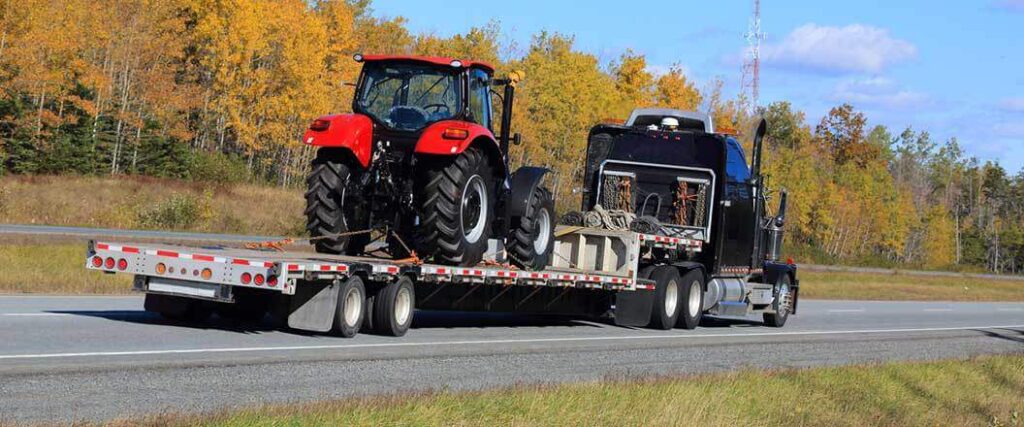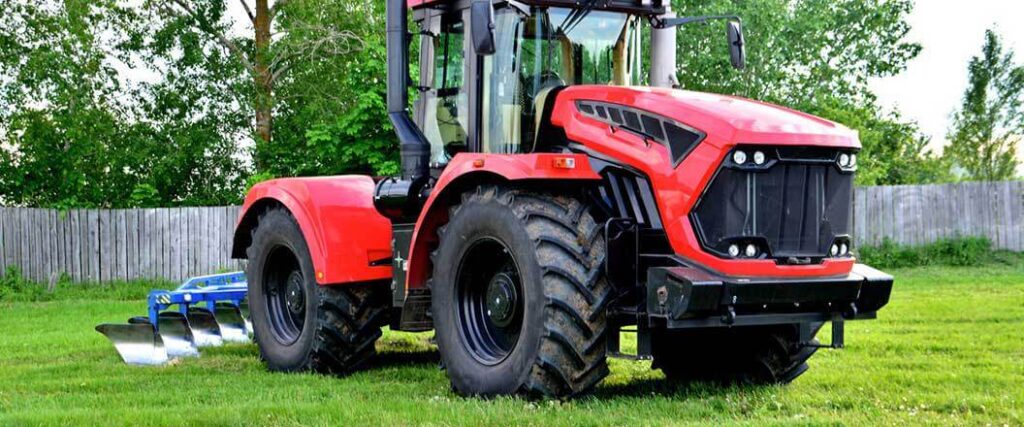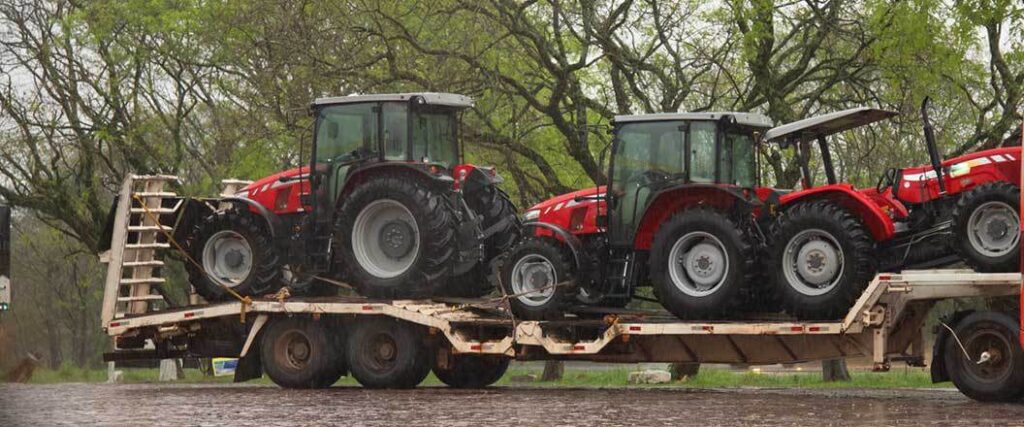Farm equipment hauling and moving heavy machinery in general has become a fine art these days. As agricultural machinery becomes more comprehensive and state-of-the-art, it requires state-of-the-art technology to transport it. It's not just about delivering the goods, but about all the preparation that goes into the entire process.
The Department of Transportation (DOT), Federal Highway Administration (FHA), and the office of Federal Lands Highway (FLH) all regulate transportation across U.S. roads and highways. Farm equipment will often travel on roads outside of the national interstate network and require careful route planning and load preparation.
With decades of experience in the logistics industry, Heavy Haul and Oversized can provide you with the information and connections to successfully arrange your agricultural transport needs.
The ability to transport farm equipment plays a major role in the agricultural industry. Making sure that heavy equipment is delivered efficiently requires a significant amount of care from start to finish.
On a basic level, farm equipment transport guarantees the day-to-day running of any farming business by making sure machinery is in place and available when needed. One farm may use numerous methods and operate on a seasonal schedule. That means farmers need to be ready when the crops are, or when the weather is just right, and they go non-stop until the process is done.
If equipment breaks down, a speedy replacement ensures the farming operation doesn’t suffer. While states with heavy agriculture tend to have relatively close facilities, there are times when materials are brought from further away.
Frequently transported agricultural equipment includes:
This equipment comes in all sizes. Tractors themselves vary greatly in size and can be paired with different attachments. Depending on the size of the farm, many may lease equipment based on seasonal needs, which makes reliable farm equipment haulers even more important.

Due to the size of many individual items or even attachments, transporting agricultural machinery safely means using sturdy equipment in the form of trailers and tie downs.
There are a wide variety of trailers out there, but agricultural hauling is often done with the following equipment:
Although the weight of the equipment might be within the range of what the trailer can carry, the state may still require a heavy haul permit based on width or height. You may also have to account for the weight of tie-down equipment. The heavier the load, the more tie-downs are required.
Equipment used to secure farm equipment to trailers includes:
Although the DOT does allow tie-down straps for farm equipment, it still needs to meet the working load requirements. Specialty tractors and harvesters can easily weigh between 15,000 to 30,000 pounds.
Carriers specializing in flatbed transportation or heavy haul services are aware of how important securing a load is. All equipment is classified by a working load limit (WLL) that cannot be exceeded.
| Tie Down Equipment | Working Load Limit (WLL) in Pounds |
| 2” Ratchet Strap | 1,000 – 2,000 lbs |
| 4” Winch Strap | 5,400 – 6,670 lbs |
| Grade 70 Chain | 4,700 – 11,300 lbs |
| Grade 80 Chain | 4,500 – 18,100 lbs |
| Grade 100 Chain | 8,800 – 22,600 lbs |
| Grade 120 Chain | 5,200 – 17,900 lbs |
The equipment’s range is based on things such as link thickness and hook attachments. With chain tie-downs especially, it’s critical to track the additional weight. Some chain grades can weigh nearly three pounds per foot. There may also be differences between ranges based on manufacturer specifications.
The Federal Motor Carriers Safety Administration (FMCSA) sets weight limits on commercial shipments traveling on national highways. The max gross weight, which is the truck, trailer, and load combined, is 80,000 pounds.
After that, state heavy haul permits are needed. Limits on the other dimensions, such as width and height, vary slightly by state. When in doubt, consult with a heavy haul cargo specialist who can review state regulations and permitting procedures with you.

When it comes to transporting farm machinery, it isn't always so straightforward. It can be a difficult task, not to mention dangerous. The size of the equipment impacts the transport service options available.
The most common shipments are those of smaller tractors or attachments that get daily use and require routine service and maintenance. While there are some service shops or even dealerships that provide pickup and drop-off services, availability is often limited.
If the equipment is small enough, you have a couple of options for tractor transport:
Most small equipment doesn’t require much in the way of heavy haul permits, so many farmers choose the first option. If you are a hotshot trucking service looking to expand, working within agricultural areas could bring a boost to your business.
Medium-sized farm equipment hauling poses a unique challenge as they’re usually too large to fit on an average trailer but are too small to justify the commercial haul rate you’re likely to pay. A local hotshot service is still an option here. When possible, you can pair the shipment with another item that would count as a partial load, which can help save the transport company on fuel and driver costs.

Reach out to us at (855) 490-2433 or fill out our quick form and a live agent will be in touch shortly.
Although rare, there are some LTL flatbed carriers that haul farm equipment. If you are a farm equipment service or sales center looking to provide shipping services for your clients, contracting with a heavy haul 3PL will give you the opportunity to work with an expansive carrier network.
By contracting out your shipping needs, you are also getting access to things such as:
When dealing with large equipment, you don’t have much choice but to use a commercial agricultural machinery transport service. Whether you’re a farmer who owns the equipment, or a dealership specializing in big brands such as John Deere or Kubota, you want to get the details right.
Qualities to look for in a farm equipment hauler include:
If the equipment is traveling across state lines or any significant distance, a carrier’s experience with heavy haul permits is also good.
Before any machinery leaves the farm or even the dealership, a few simple steps are needed to make the process safer.
A pre-shipping checklist should include the following tasks:
Anything you can do to make the shipping process safer helps ensure both the well-being of your equipment and that of surrounding motorists.

We can’t discuss farm equipment shipping without touching on the cost. The average flatbed shipping rates come out to about $3 – $5 per mile. However, shipping quotes for heavy machinery are often going to include a few additional price points.
The most frequent expenses besides the shipping itself are:
Completing a free quote form online can provide shippers with a base amount, but typically won’t include the price of such expenses. Additionally, when the equipment is specifically meant for use on a farm, ranch, or other agricultural venture, several government exemptions may apply.
Exemptions for vehicles, machinery, and even drivers are possible in the following cases:
There are further exemptions applicable to specific agricultural industries. To get the most accurate information on what exemptions you may qualify for, contact a heavy haul specialist that is familiar with agricultural machinery shipping and transport.
Having your agricultural machinery delivered promptly makes a big difference in the farming industry. Many practices associated with farming are notoriously time-sensitive, from harvesting of crops to spraying pesticides. When one item of machinery breaks down, the whole farm can suffer, severely impacting the business.
Work with the heavy haul experts at Heavy Haul and Oversized for all your farm equipment hauling needs.
Our nationwide network of partner carriers have access to all the tools you need:
If you need it shipped, we have the means and the expertise to make it happen so your business doesn’t have to slow down.
Call us today at (855) 490-2433 to speak with one of our representatives. For a risk-free quote, complete an online form now and get started on your next big move.
Heavy Haul and Oversized
315 NE 14th Street #4122
Ocala, FL 34470